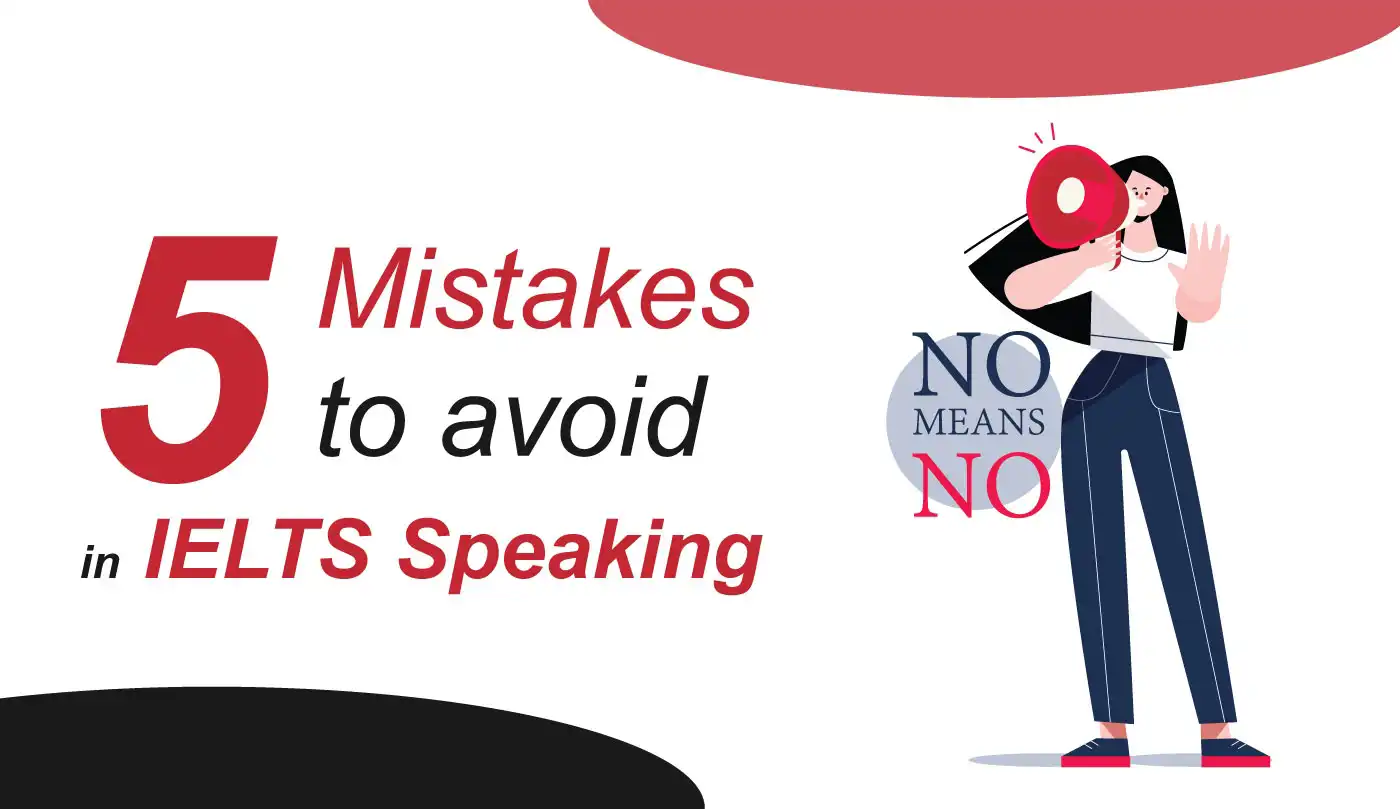• IELTS
5 Mistakes to Avoid in IELTS Speaking
4740 Reads
3 min Read
IELTS Speaking module is one of the four modules that an IELTS test has and it is the final section of the IELTS exam. It takes place on an individual basis and It’s possible to take the speaking test in a group of up to 10 candidates; however, this is much more challenging for all involved.

IELTS Speaking module is one of the four modules that an IELTS test has and it is the final section of the IELTS exam. It takes place on an individual basis and It’s also possible to take the speaking test in a group of up to 10 candidates; however, this is much more challenging for all involved. In this module, the examiner asks you questions about your personal experiences or general topics, such as vacation destinations or activities you enjoy and it lasts for 12 minutes which requires you to demonstrate your proficiency in English by responding to everyday conversation prompts. You may feel nervous about this part of the exam because it’s different from anything else you’ve done before. Therefore in this blog, we are outlining the top 5 mistakes you should avoid while giving your IELTS speaking test.
Failing to develop your responses in Part 1 fully and not using the paper during the preparation time for Part 2
The answer "no" or "yes" won't be enough to convince the examiner that you can talk with confidence. If you feel that keeping your responses brief may hide your grammatical errors; Then, I would say "no", it can't, since grammar is one of the four evaluated areas, you won't perform well on this test. Other than that, try to explain, for example, if the question is "Do you like flowers? And your answer is "no," then, you can say "No, I'm allergic to most of flowers, so even though they're gorgeous, they make me sneeze. Therefore, I don't like them.
Other than that, you will have to speak on the given topic for about two minutes in Part 2 of the Speaking test. You will get a piece of paper, a pencil, and one minute to make some notes as well. So, make sure to make notes in that one minute! Moreover, only few people can speak for two minutes on-the-spot about a topic, let alone a timed test. IELTS exam takers who attempt to speak without notes are not able to fulfill the needs.
You can use the topic and the talking points provided on a card to structure your answer into a beginning, a middle, and an end. Don't hold back on speaking too much, either. Once the time for the discussion is up, the examiner will stop you.
Also Read : IELTS Syllabus
- Claiming that you are unable to express yourself
There is a high risk that you might forget a word and it's understandable if you can't recall things because the test is timed and you are under pressure. Nevertheless, try your best to clarify or rephrase what you mean. Put it another way, try again rather than giving up and claiming you forgot how to say something. Imagine, for instance, that you forgot the term "bookcase." In that case, you may say, "the place with shelves where I keep my books." Rather than worrying or confessing you forgot. Most commonly, those who utilize paraphrasing will be able to recall the word later.
- Speaking for less than two minutes in Part 2 and providing no evidence for your arguments in Part 3
Speak for two minutes; Prepare your speech and write some examples to support your points. In the meantime, there will be no interruption from the examiner. Instead, if you hesitate, they will wait for you to think. You might also get distracted and feel uneasy during these situations. In that situation, write down some examples to illustrate your points in the given minute. Even better, take mock tests to practice taking notes and speaking for two minutes to prepare for this difficult task. These tests will help you learn how you can avoid pauses and run out of things to say. You can also talk about the issues that concern you and your personal life in Part 1 and 2. Especially for part 3, you must be able to engage in deep discussions about your ideas. On issues like global warming, for instance, you might have to give your opinion. Therefore, you must provide justifications and examples from the real world to back up your claim. It might be helpful to recall how you composed your essay for the exam's writing section. Ideally, you might have introduced, clarified, and supported ideas with a few instances. Utilize this line of thinking while discussing answers in Part 3.
Also Read : What is IELTS?
- Using impressive high-level words without relevance
Yes, vocabulary makes up 25% of your final grades, but remember that there are other factors as well. Some students try to impress the examiners with a vast, impressive vocabulary that has no bearing on the topic or question being asked. However, you must accurately and contextually use the words. You risk missing the solution if you pause mid-sentence to remember a new word you learned about a topic. Therefore, you must use different words, but remember using them appropriately, naturally, and flexibly. Therefore, it is better to be natural and effortless.
- No clarity in your answers
The next error you might commit is speaking and answering incoherently. Pronunciation, which makes up 25% of your band scores, includes clarity. Whichever accent you have, it has no bearing on your band score. Accents are irrelevant; what counts is that the examiner can clearly understand your response. Your mother tongue might occasionally have an impact on the words you pronounce. Therefore, learn to pronounce the terms correctly and practice doing so.
Now, if you feel that you might make these mistakes in IELTS speaking module or you are prone to make these mistakes. Then, you can immediately enroll at the Canamprep - The Best IELTS, PTE & TOEFL institute that will teach you how you can avoid these IELTS speaking mistakes in order to excel & succeed in the IELTS speaking module of your IELTS exam through its highly dedicated and prominent faculties and teachers.
Also Read : IELTS Eligibility
FAQ
Get great articles direct to your inbox
The latest news, articles, and resources, sent straight to your inbox every month.
Popular Universities to Study Abroad
World class education waiting for you.

Centennial College - Ashtonbee Campus
Ontario, Canada • 15 Programmes
Tuition Fee : CAD 15500-24500 / year

University of Essex - Colchester Campus
England, UK • 600 Programmes
Tuition Fee : GBP 17000-21000 / year

Global University Systems (GUS) - University for the Creative Arts - Canterbury Campus
England, UK • 38 Programmes
Tuition Fee : GBP 16000-17000 / year


.png)

Sprott Shaw College - East Vancouver College Campus
British Columbia, Canada • 19 Programmes
Tuition Fee : CAD 10000-38000 / year
.png)
Northeastern University - Vancouver Campus
British Columbia, Canada • 21 Programmes
Tuition Fee : CAD 0-0 / year
Popular English Language Proficiency Exams
IELTS Online
- Live Classes
Blogs and Articles
Curated content to keep you updated on the latest education trends, news and more.
A Guide to calculating CGPA to percentage to study abroad
Updated on • Apr 25,2025 05:36 PM IST • Study Abroad
SAT Exam 2025: Dates, Registration, Eligibility, and Preparation Tips
Updated on • Apr 25,2025 10:39 AM IST • Education
Ireland Student Visa Process 2025 | Step-by-Step Guide & Requirements
Updated on • Apr 19,2025 03:30 PM IST • Ireland
ACT vs. SAT: Which One to Choose?
Updated on • Apr 14,2025 01:46 PM IST • Study Abroad
Updated on • Apr 11,2025 05:53 PM IST • IELTS
Backlog Certificate: A Complete Guide
Updated on • Apr 11,2025 01:47 PM IST • Study Abroad Guidance
PTE Score Chart 2025: PTE Exam Scoring System & Calculation
Updated on • Apr 09,2025 05:37 PM IST • PTE
Master's in Computer Science in the USA
Updated on • Apr 08,2025 05:59 PM IST • USA
Top Trending MBA Specialisations in 2025
Updated on • Apr 08,2025 04:47 PM IST • Study Abroad
Describe Your Hometown IELTS Speaking Part 1 Topic
Updated on • Apr 07,2025 05:50 PM IST • IELTS
How to Get a Job in USA in 2025
Updated on • Apr 07,2025 03:19 PM IST • USA
Highest Paying Jobs in the World
Updated on • Apr 01,2025 05:31 PM IST • Study Abroad
Student Life in Ireland in 2025
Updated on • Mar 29,2025 05:50 PM IST • Ireland
Top Public Universities in Germany
Updated on • Mar 26,2025 04:33 PM IST • Germany
Top Universities for Masters in Ireland in 2025
Updated on • Mar 25,2025 04:36 PM IST • Ireland
Cost of Living in Singapore for Indian Students in 2025
Updated on • Mar 22,2025 11:57 AM IST • Singapore
PTE vs IELTS : Know the Difference and Which is Easier?
Updated on • Mar 21,2025 03:38 PM IST • IELTS
Updated on • Mar 20,2025 10:19 AM IST • Germany
Updated on • Mar 12,2025 11:20 AM IST • Ireland
Updated on • Mar 11,2025 01:18 PM IST • USA
Related Blogs and Articles
A little effort to provide an authentic and reliable content for keen readers!!
Updated on • 11-04-2025 • IELTS
Describe Your Hometown IELTS Speaking Part 1 Topic
Updated on • 07-04-2025 • IELTS
PTE vs IELTS : Know the Difference and Which is Easier?
Updated on • 21-03-2025 • IELTS
IELTS Exam Dates 2025 in India
Updated on • 18-01-2025 • IELTS
IELTS Reading Practice Tests 2025: Reading Passage and Sample Questions
Updated on • 15-01-2025 • IELTS
IELTS Letter Writing Topics 2025
Updated on • 15-01-2025 • IELTS
Canada IELTS band requirements 2025
Updated on • 10-01-2025 • IELTS
Updated on • 25-11-2024 • IELTS
Updated on • 21-11-2024 • IELTS
Updated on • 02-11-2024 • IELTS
Linking Words for IELTS Speaking - Word List & Tips
Updated on • 25-10-2024 • IELTS
IELTS Writing Task 2 - Academic and General Topics with Sample Answer
Updated on • 25-10-2024 • IELTS
IELTS Writing Task 2: Tips, Lessons & Models
Updated on • 25-10-2024 • IELTS
IELTS Test Report Form (TRF): Number, Tracking, Validity and Sample
Updated on • 25-10-2024 • IELTS
IELTS Speaking Samples and Answers
Updated on • 25-10-2024 • IELTS
Updated on • 25-10-2024 • IELTS
Updated on • 25-10-2024 • IELTS
IELTS Sample Charts for Writing Task 1 Practice
Updated on • 25-10-2024 • IELTS
IELTS GT Writing Task 1/ IELTS Letter Writing
Updated on • 25-10-2024 • IELTS
Updated on • 25-10-2024 • IELTS















